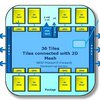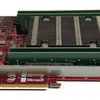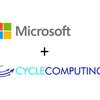If there was any question that machine learning would spawn chip designs aimed specifically at those applications, those doubts were laid to rest this year. The last 12 months have seen a veritable of explosion of silicon built for this new application space.
Episode 190: Addison Snell and Michael Feldman discuss Microsoft's acquisition of Cycle Computing, plus HPE's supercomputer in space.
IBM is teaming up with four research institutions in an effort to study the effects of the human microbiome on autoimmune diseases. The effort, known as the Microbiome Immunity Project, is purported to be the largest study to date of the bacteria in the human microbiome.
At the Hot Chips conference this week, Intel lifted the curtain a little higheron Knights Mill, a Xeon Phi processor tweaked for machine learning applications.
At the Hot Chips conference this week, Microsoft has revealed its latest deep learning acceleration platform, known as Project Brainwave, which the company claims can deliver real-time AI. The new platform uses Intel's latest Stratix 10 FPGAs.
While AI is poised to sweep through major sectors of the economy over the next decade, perhaps no industry should be more welcoming to this technology than that of healthcare. And given that the US is the most technologically advanced nation in the world, and the one with the most expensive healthcare, the country could end up being the proving ground for AI-powered medicine.
The National Science Foundation (NSF) is soliciting proposals from US universities to acquire a $60 million next-generation supercomputer two to three times as powerful as Blue Waters.
Addison Snell and Michael Feldman discuss IBM's record benchmark and Oak Ridge's Summit build.
Melbournes Swinburne University is going to deploy its first petascale supercomputer, a Dell EMC machine that will be tasked to support cutting-edge astrophysics and other scientific research.
Microsoft has bought Cycle Computing, an established provider of cloud orchestration tools for high performance computing users. The acquisition offers the prospect of tighter integration between Microsoft Azures infrastructure and Cycles software, but suggests an uncertain future for the technology on Amazon Web Services (AWS) and Googles cloud platform.








